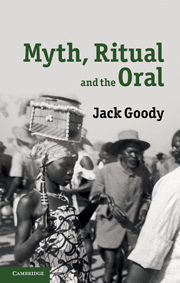Book contents
- Frontmatter
- Contents
- Acknowledgements
- Introduction
- 1 Religion and ritual from Tylor to Parsons: the definitional problem
- 2 Oral ‘literature’
- 3 The anthropologist and the audio recorder
- 4 Oral creativity
- 5 The folktale and cultural history
- 6 Animals, humans and gods in northern Ghana
- 7 The Bagre in all its variety
- 8 From oral to written: an anthropological breakthrough in storytelling
- 9 Writing and oral memory: the importance of the ‘lecto-oral’
- Appendix Folktales in northern Ghana
- References
- Index
2 - Oral ‘literature’
Published online by Cambridge University Press: 05 June 2012
- Frontmatter
- Contents
- Acknowledgements
- Introduction
- 1 Religion and ritual from Tylor to Parsons: the definitional problem
- 2 Oral ‘literature’
- 3 The anthropologist and the audio recorder
- 4 Oral creativity
- 5 The folktale and cultural history
- 6 Animals, humans and gods in northern Ghana
- 7 The Bagre in all its variety
- 8 From oral to written: an anthropological breakthrough in storytelling
- 9 Writing and oral memory: the importance of the ‘lecto-oral’
- Appendix Folktales in northern Ghana
- References
- Index
Summary
In this chapter, I shift from discussing general problems about the definition of religion, ritual and orality to a more specific area with ‘myth’ and other ‘standardized oral forms’, or what is often called ‘oral literature’. Here I survey the different forms so that I can go on to analyse and criticize the material I (and my helpers) collected among the LoDagaa and elsewhere in northern Ghana. I argue that the context of recitation, especially the audience, has to be considered more seriously. By lumping all together, anthropologists and others have given equal weight to folktales as to ‘myths’, not realizing that the first are often specifically children's ‘literature’ and therefore cannot be taken as representative of adult thinking. ‘Myths’ again are seen as typical of oral cultures, and a genre which is transformed by the advent of writing, like many of the others. However, folktales, directed largely to children, also persist in the nurseries of written cultures.
Oral ‘literature’ was the standard form (or genre) found in societies without writing. The term is also used to describe the quite different tradition in written civilizations where certain genres are transmitted by word of mouth or are confined to the unlettered (the ‘folk’). One is using ‘literature’ even of purely oral terms. Nevertheless, it is the best phrase available for describing these two usages, although they should often be distinguished.
- Type
- Chapter
- Information
- Myth, Ritual and the Oral , pp. 41 - 57Publisher: Cambridge University PressPrint publication year: 2010



